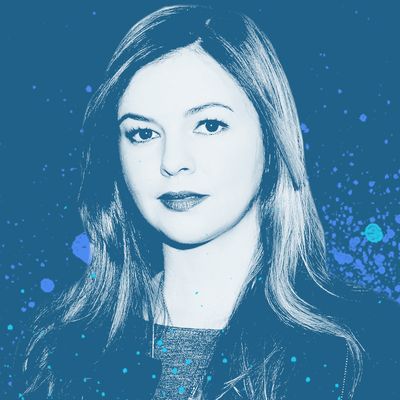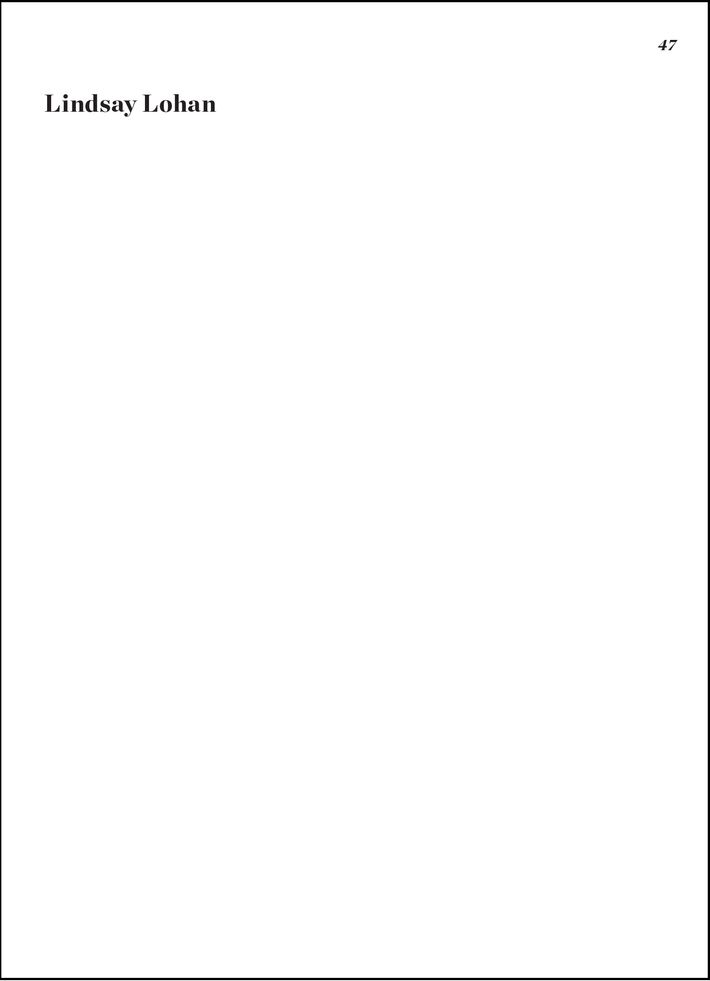
Actress Amber TamblynÔÇÖsnewest book of poetry, a collection called Dark Sparkler, is out this week, and mostly┬ácenters around dead or otherwise fabled Hollywood starlets. There is one who┬ácommitted suicide by breathing carbon monoxide in her garage, one who jumped to her death off the ÔÇ£HÔÇØ in the Hollywood sign, one who was strangled by her jealous ex-boyfriend in the driveway of their home. YouÔÇÖll already know the stories of some (Dana Plato, Jayne Mansfield, Brittany Murphy), but others (Dominique Dunne, Frances Farmer, Heather OÔÇÖRourke) will send you down a dark Wikipedia spiral through HollywoodÔÇÖs most tragic demises. ThereÔÇÖs one living soul included in TamblynÔÇÖs collection: Lindsay Lohan. Vulture got the exclusive to excerpt the poem, then spoke to Tamblyn about what it meant to her and what it was like writing this book.

You are going to get a lot of questions about the Lindsay Lohan poem ÔÇö or the lack of poem.
Well, tell me what do you take away from it? I am curious.
Even if you donÔÇÖt know the context of the book, just to have her name on a blank page, essentially, is very distressing.
So it distresses you?
To have her name on the top of a blank page is saying something.
It is so different for every single person that I have talked to, which is kind of the point I was trying to make about treating people like objects and how we, as a society and a culture, project our feelings onto other people. This is certainly the case with celebrities. We feel we have every right to do that.
I read it out loud once, that page in the context with a couple of pieces, and everybody laughed, and it was so upsetting for me that I told myself I would never do it again. I did not think people were going to laugh. I thought it would really strike a chord, but I know that is also how people process things when they are uncomfortable.
She is still the butt of the joke.
For me, I did not put that in there to say, ÔÇ£YouÔÇÖre next.ÔÇØ I put that in there to say, ÔÇ£I am not going to do you what everyone else does,ÔÇØ which is write a poem about your life ÔÇö which is not my life. I am not going to project onto your story. I am giving this back to you to write. This belongs to you. Your poem has not been written yet, and it belongs to you. ItÔÇÖs less a statement that she deserves to be grouped in with a bunch of dead women and more of a statement of she deserves to be in there because she is treated like those dead women already; she is treated like she is already dead. Everyone has their own take or different feeling about it.
People are going to read it however they want.
The difference for me is how we perceive people and what we think about them, as opposed to what it felt like to be them. To write about and to talk about what it actually feels like ÔÇö and that is not to say you should sympathize ÔÇö┬áyou should empathize with your fellow women, because at the end of the day, every woman I know is an idol. Every woman I know on any given day is like, ÔÇ£I am a fucking boss. IÔÇÖm amazing today. They are staring at me; they want to take my picture.ÔÇØ There is that feeling, right? And at the end of the day, that comes and goes depending on how people treat you, and it can be a very painful element. With these women, their lives are searchable. You can find anything you want.
You really sent me down a dark Wikipedia spiral with these poems. Were you aimlessly clicking around, finding connections between them?
Once I sold [the collection] to HarperCollins, I had washed my hands of it. My editor said, ÔÇ£I really want to read about your experience writing these poems,ÔÇØ and I had already felt definitively that I had inserted myself enough in the book, and what an even more actor thing to do ÔÇö what an even more narcissistic thing to do to go like, ÔÇ£You know, it is not just about their pain, itÔÇÖs about my pain.ÔÇØ He said, ÔÇ£That is the most important thing, because you are writing about the internal lives of these dead women and youÔÇÖre not letting us into your own internal life of how it felt to be writing them.ÔÇØ I couldnÔÇÖt really fight him. I just truthfully did not want to have to go back over all the old emails. I just didnÔÇÖt want to have to relive it, but I knew I had to.
There were a few eerie connections between the women. For example, I had no idea about that both the actress who starred in Savannah Smiles and the porn star who took her name committed suicide.
Neither did I. IsnÔÇÖt that a trip? That is just crazy.
Yeah.
It sent chills through me when I read an interview with Shannon Michelle Wilsey. I knew the same ones you do. Like Dana Plato ÔÇö ┬áI remember her. I just remembered off the top of my head the pretty straightforward ones, and then I would have to start Googling actors that died before their time, and before I knew it, so many were popping up.
ItÔÇÖs like E! True Hollywood Story in here ÔÇö like the actress who jumped off the ÔÇ£HÔÇØ in the Hollywood sign. ItÔÇÖs almost like an urban legend, but then you are Googling it and are like, Shit, this is actually what happened to someone.
I had read that she went to a party at her uncles house and everything seemed totally fine, and then she walked out the front door and just walked up the hill and jumped off the H. Like, there seems to be no reason, there is nothing leading up to it, she was not in and out of the hospital, so in that sense, I thought, Oh, it would be interesting to write from the perspective of her shoes  Like talking her into doing this.
In the book, you go from women who lived a long time ago to someone like Brittany Murphy, who died pretty recently.
[That] was the very first poem that was written, and she was the only one that was my contemporary. Someone whom I didnÔÇÖt know personally, but we auditioned together all the time. The only time I ever saw her in person was her coming out of the audition room for 8 Mile, and I went in right after her. That is the only time I ever saw her in my whole life, but in that sense, she knew names I knew; she was a contemporary. I had friends that dated her, like there was just sort of six degrees [of separation] around it. It was the same with Heath Ledger, but it is a very different experience for a man in the business than it is for a woman. She was the only woman who was a peer, and we were maybe only about four years apart or something.
IÔÇÖm sure that itÔÇÖs not that fun to be Googling dead women and trying to think of their mindset.
No, it became obsessive. I thought it was going to be simple, and I thought I would sort of put myself in it a little bit. I didnÔÇÖt realize how deep and how far it would go, and how complicated it would be along the six years it took to write it.
Do you relate to these women?
I sort of related to them, but I also did what we all do. Whether you are a celebrity or not, you project your own feelings onto all of them. Projected my own truths according to what I go through in my life, regardless of what I do for a living. There are poems in there that are also about fake actresses, and that was my way of injecting my own voice and being able to create personas of me, and put it within the context of these women. That was about as close to their reality as I could come, which is just imagining, something we all do.

